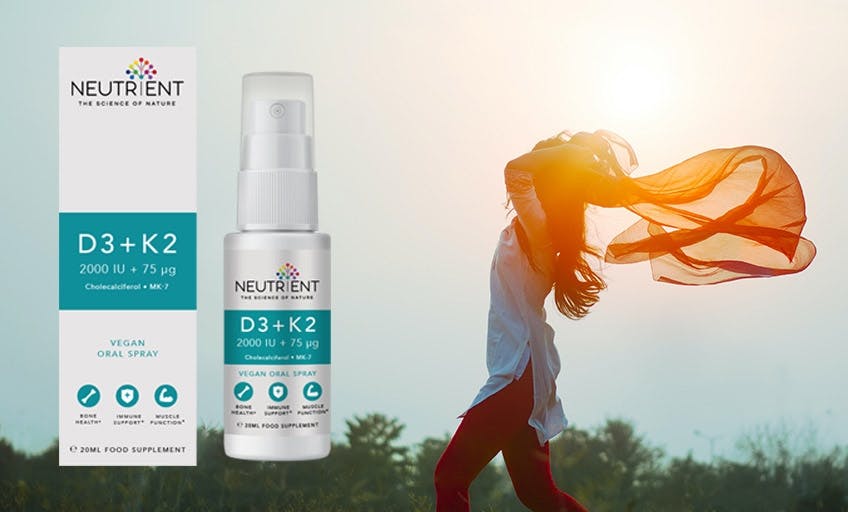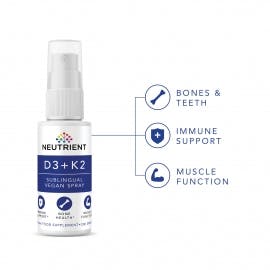Introducing Neutrient D3+K2
We’ve just added a new winter wellness product to the Abundance and Health product range called Neutrient D3+K2. This unique vegan oral spray contains highly absorbable forms of the essential vitamins D3 and K2. Nutritional Therapist, Jackie Newson reveals lifestyle factors that lower vitamin D, explains the impact of a vitamin D or vitamin K deficiency, suggests an easy home test kit and reveals the best forms for effective supplements.
Since vitamin D plays such a starring role in our immune defence, a deficiency of vitamin D is of particular concern considering the types of viruses and winter infections that this unusual year is highlighting.
Sunshine Vitamin D
Vitamin D is normally produced by skin cells when exposed to the UVB rays found in sunlight and your liver and kidneys help convert vitamin D into a more active form that your cells can use. Shorter days and fewer hours of sunlight mean that most of us are tucked-up indoors and layer-up to keep warm when we do go outside, so our skin cells just don’t make the same amount of sunshine vitamin D across winter compared to the summer.
Considering how important vitamin D is for the immune system and the knowledge that vitamin D deficiencies are widespread in countries across Europe and the Northern Hemisphere the message is loud and clear – taking a daily vitamin D supplement across the winter months is highly recommended.
One Spray a Day!
Vitamin D is hard to absorb through the intestine which is why experts suggest that taking capsules and tablets aren’t the most effective way to restore vitamin D levels. With oral sprays however, the vitamin D3 quickly and easily absorbs across the surfaces of the cheeks and heads straight into the bloodstream. With just one spray a day of the new vegan Neutrient D3+K2 you’ll be getting 2000IU of this essential winter vitamin. What’s more Neutrient D3+K2 delivers the active D3 form, which has far superior absorption and utilisation than standard forms of vitamin D. Interestingly, it’s the D3 form of this vitamin that is predominantly screened for in blood tests as an indicator of vitamin D nutritional status, another reason why vitamin D3 is generally recommended as the preferred choice for supplementation.
Get Tested – Easy Skin Prick Vitamin D Blood Test Kit
It’s the elderly, infants, pregnant women and individuals with darker skin that are most at risk but if you live in country with limited daylight and a cold temperament then it’s worth getting your vitamin D levels checked, especially if you suffer from the winter blues and frequent infections. If you want to check your vitamin D status you can do this easily with a simple skin prick blood test kit available from chemists or online from £25-£50.
Vitamin D deficiency
Vitamin D deficiency is associated with increased risk of rickets and retarded growth in children, weak and brittle bones in adults plus calcium malabsorption, gum disease, osteoporosis and even depression. Indoor lifestyles, kidney and liver disease, malabsorption conditions and even certain medications such as steroids, anticonvulsants, metformin, proton pump inhibitors, some antiepileptic drugs and HIV medication, deplete vitamin D.
Introducing the New Neutrient Total D3+K2
- Just one spray a day delivers 2000IU vitamin D3 with 75mcg vitamin K2.
- Handy vegan oral spray providing bioactive forms for maximised absorption.
- Provides vitamin D3, shown to be the most bioactive form of vitamin D1.
- A fast and convenient way to increase your vitamin D and K intakes.
- Vitamin D3 is more effective at raising blood levels of vitamin D than vitamin D21.
- Vitamin D3 and vitamin K2 contribute to the maintenance of normal bones.
- Vitamin K2 contributes to normal blood clotting an important process for wound healing.
- Great alternative for those who find swallowing pills and capsules difficult.
- Ideal for anyone with malabsorption conditions such as IBS or Crohn’s disease.
Specific Roles of Vitamin D3
The fact that vitamin D is considered a steroid hormone which regulates more than 200 genes throughout the body explains the influence it has over a broad range of metabolic, physical and cognitive functions. As well as helping to regulate blood pressure in the kidneys and blood sugar levels in the pancreas, studies suggest that vitamin D may induce cell differentiation and reduce cell proliferation2, important aspects of the body’s growth and repair processes. Other health benefits of vitamin D include:
- normal function of the immune system
- maintenance of normal bones and teeth
- regulation of normal absorption and utilisation of calcium and phosphorus
- regulation of normal blood calcium levels
- maintenance of normal muscle function
7 Things That Affect Your Vitamin D Levels:
- Your diet – there are only a few food sources of vitamin D which include oily fish, whole fat milk, full-fat yoghurt, mushrooms and eggs. So if you are vegan or vegetarian you may be at risk.
- Where you live – if you live in a country with restricted daylight hours during several months of the year or live at a high altitude then you may not be getting enough vitamin D during the winter.
- Using sunscreen – sunscreen prevents sunburn by blocking UVB light, so theoretically, sunscreen use may lower vitamin D levels.
- Your skin colour – dark-skinned people tend to require more UVB exposure than light-skinned people to generate the same amount of vitamin D.
- Your weight – studies reveal that vitamin D deficiency is common in those that are overweight or obese. Vitamin D gets ‘locked up’ in fat tissue making it less available to the body.
- Your age – older people tend to have lower levels of the substances required by skin cells to make vitamin D and the rate at which vitamin D is produced gets slower the older you become.
- Your gut – vitamin D is vulnerable to the action of stomach acid and digestive juices, which means not all of it gets absorbed and digestive conditions such as celiac disease, chronic pancreatitis and Crohn's disease make vitamin D absorption more challenging.
Some People Have a Higher Risk of Vitamin K Deficiency
Vitamin K deficiency is characterised by easy bruising and excessive bleeding due to inadequate blood clotting factors. Vitamin K deficiency is not common because this nutrient is widely available in food, as well as being produced by bacteria in the gut microbiome. It’s worth noting that exclusively breast-fed babies may be at risk of vitamin K deficiency since breast milk is relatively low in vitamin K compared to formula milk3. You may be at greater risk of deficiency if you:
- Suffer from a malabsorption disorders such as inflammatory bowel disease
- Have recently had gastrointestinal surgery
- Take a medication that interferes with the absorption of fat-soluble vitamins and vitamin K or take anti-coagulants
- Have significant liver damage or liver disease
- Don’t eat enough vitamin K rich foods in your diet
Not all Vitamin D and K Supplements are Vegan
Vitamin D and K are available in supplements in different forms and from different sources. Some are sourced from animal products, some from microbes and some are synthetic. Neutrient D3+K2 contains only vegan, natural and highly bioactive forms of vitamin D3 and contains the vegan MK-7 form of vitamin K2. Here’s a summary of the various forms available:
- Vitamin D2 vegan source from yeast.
- Vitamin D3 sourced from non-vegan lanolin (sheep’s wool) or cod liver oil and vegan source from algae.
- Vitamin K1 is synthetic.
- Vitamin K2 available as MK-4 or MK-7 natural forms and vegan.
Six Quick Facts about Vitamins D3 and K2
- Sunlight is the most potent source of vitamin D. Just 5-10 minutes of midday sun supplies 3000IU of vitamin D3 for light-skinned people.
- Fat cells tend to trap vitamin D which is why obesity is linked to vitamin D deficiency.
- Mushrooms are a source of vitamin D, which can be enhanced if you place them gills upwards outdoors in the sunshine.
- Vitamin K is a fat-soluble vitamin, which means dietary fat is necessary for its absorption.
- Vitamin D3 plays a role in insulin secretion so low vitamin D status may have an adverse effect on glucose tolerance in Type 2 diabetes.
- Newborn babies have low levels of vitamin K, which may result in haemorrhagic disease.
References
Hart K, Lambert H, Tripkovic L et al. Comparison of vitamin D2 and vitamin D3 supplementation in raising serum 25-hydroxyvitamin D status: a systematic review and meta-analysis. Am J Clin Nutr. 2012;95(6):1357-64.
The Expert Group on Vitamins and Minerals (EVM) 2003. Safe Upper Levels for Vitamins and Minerals. https://cot.food.gov.uk/sites/default/files/vitmin2003.pdf [accessed 29.11.20]
Linus Pauling Institute. Vitamin K. https://lpi.oregonstate.edu/mic/vitamins/vitamin-K . [accessed 23.11.20]




